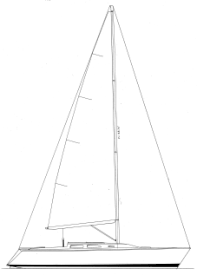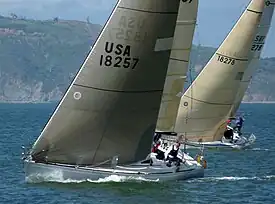Express 37
The Express 37 is an American light displacement sailboat designed by Carl Schumacher as a racer-cruiser.[1][2][3]
 | |
 Express 37s pHat Jack and Stewball racing on San Francisco Bay | |
| Development | |
|---|---|
| Designer | Carl Schumacher |
| Location | United States |
| Year | 1984 |
| No. built | 65 |
| Builder(s) | Alsberg Brothers Boatworks |
| Name | Express 37 |
| Boat | |
| Displacement | 9,800 lb (4,445 kg) |
| Draft | 7.25 ft (2.21 m) |
| Hull | |
| Type | Monohull |
| Construction | Fiberglass |
| LOA | 37.08 ft (11.30 m) |
| LWL | 30.83 ft (9.40 m) |
| Beam | 11.50 ft (3.51 m) |
| Engine type | Yanmar 2GMF 18 hp (13 kW) diesel engine |
| Hull appendages | |
| Keel/board type | fin keel |
| Ballast | 4,600 lb (2,087 kg) |
| Rudder(s) | internally-mounted spade-type rudder |
| Rig | |
| Rig type | Bermuda rig |
| I foretriangle height | 48.75 ft (14.86 m) |
| J foretriangle base | 14.33 ft (4.37 m) |
| P mainsail luff | 42.00 ft (12.80 m) |
| E mainsail foot | 13.75 ft (4.19 m) |
| Sails | |
| Sailplan | Masthead sloop |
| Mainsail area | 288.75 sq ft (26.826 m2) |
| Jib/genoa area | 349.29 sq ft (32.450 m2) |
| Total sail area | 638.04 sq ft (59.276 m2) |
Production
The design was built by Alsberg Brothers Boatworks in Santa Cruz, California from 1984 to 1988, but is now out of production. A total of 65 were completed.[2][4]
Design
The Express 37 is a recreational keelboat, built predominantly of fiberglass, with wood trim. It has a masthead sloop rig, a raked stem, a reverse transom, an internally mounted spade-type rudder controlled by a tiller and a fixed fin keel. It displaces 9,800 lb (4,445 kg) and carries 4,600 lb (2,087 kg) of lead ballast.[2]
The boat has a draft of 7.25 ft (2.21 m) with the standard keel fitted. The later Mk II model offered an optional shallow draft keel of 5.92 ft (1.80 m).[2]
The first 25 boats built were fitted with a Japanese Yanmar 2GMF two cylinder diesel engine of 18 hp (13 kW). Later boats had a three-cylinder Yanmar 3GMF diesel engine of 27 hp (20 kW). The fuel tank holds 30 U.S. gallons (110 L; 25 imp gal) and the fresh water tank has a capacity of 85 U.S. gallons (320 L; 71 imp gal).[2][5]
The later Mk II version has a taller rig, an updated keel and rudder and a more cruising oriented interior. Only ten were built in this configuration.[5]
Operational history
The Express 37 finished first, second and third in its debut at the 1985 Transpacific Yacht Race.[5][6]
In a 2005 used boat review in Sailing Magazine, writer John Kretschmer concluded of the design, "The Express 37 offers exhilarating performance both on and off the racecourse. And although one-design fleets are shrinking, most 37s have a lot of speed left in them. Also, following the trend of their boats, as racing sailors get older and migrate toward more casual sailing, a logical decision might be to convert a 37 into more of a cruising boat."[5]
Marine surveyor and naval architect, Jack Hornor described the design in a 2007 review, "the Express 37 will appeal to sailors interested in racing more than the dedicated cruiser; although, there is no reason these mid-1980s models can’t serve double duty for prospective buyers looking for a reasonably priced, solidly constructed racer/cruiser...Although contemporary in appearance, Schumacher’s respect for the beauty of traditional, well balanced boats is apparent in this design."[6]
See also
Related development
Similar sailboats
References
- "Latitude 38 Features: Carl Schumacher, 1949-2002". Latitude38.com. Archived from the original on 9 April 2022. Retrieved 3 September 2012.
- Browning, Randy (2019). "Express 37 sailboat specifications and details". sailboatdata.com. Archived from the original on 9 April 2022. Retrieved 31 March 2019.
- McArthur, Bruce (2022). "Carl Schumacher". sailboatdata.com. Archived from the original on 5 July 2021. Retrieved 9 April 2022.
- McArthur, Bruce (2022). "Alsberg Brothers Boatworks". sailboatdata.com. Archived from the original on 9 April 2022. Retrieved 9 April 2022.
- Kretschmer, John (June 2005). "Express 37". Sailing Magazine. Archived from the original on 9 April 2022.
- Hornor, Jack (February 2007). "Express 37". Spinsheet. Archived from the original on 23 November 2007.